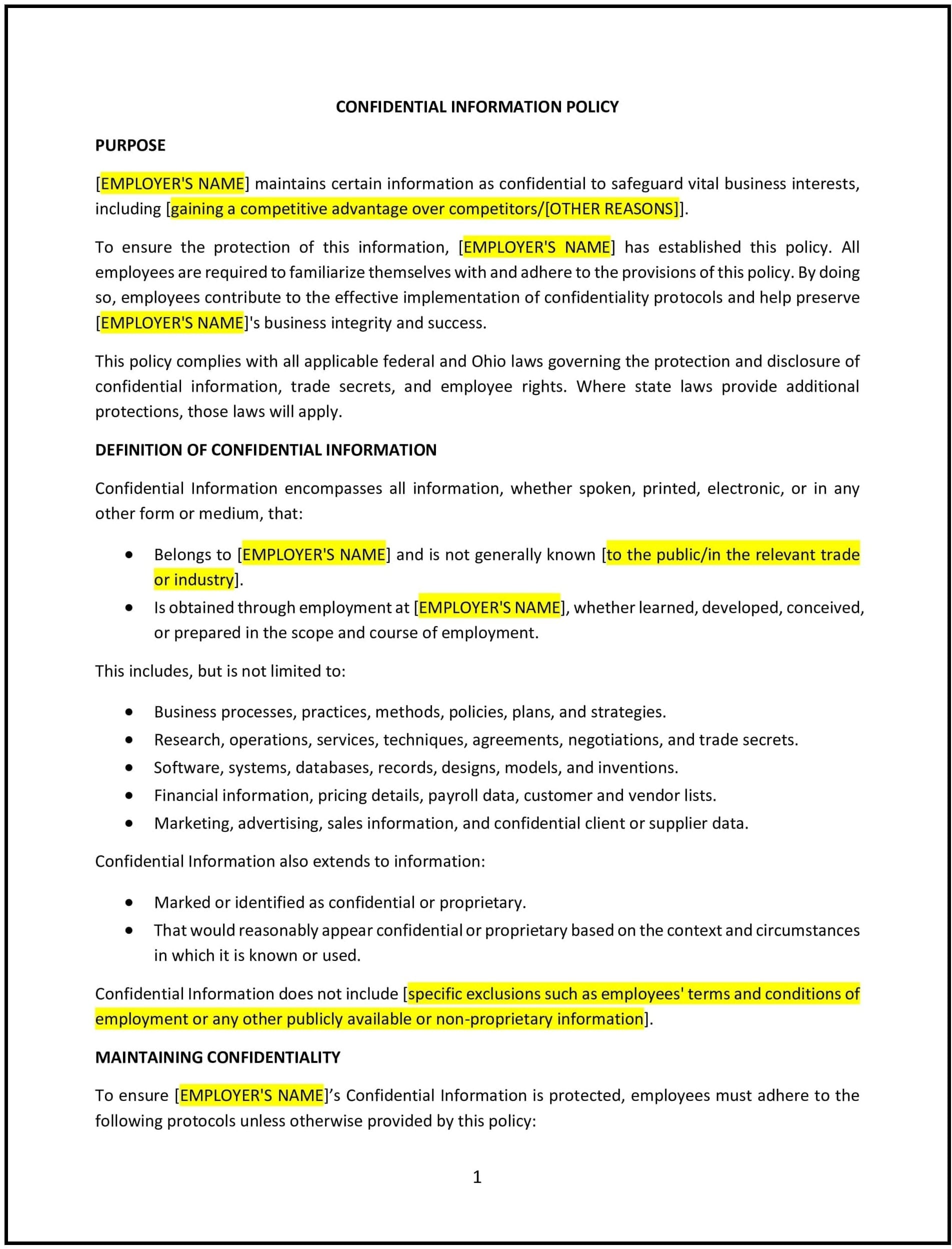Confidential information policy (Ohio): Free template
Got contracts to review? While you're here for policies, let Cobrief make contract review effortless—start your free review now.

Customize this template for free
Confidential information policy (Ohio)
A confidential information policy provides Ohio businesses with clear guidelines for handling, storing, and sharing sensitive company information. This policy ensures that employees understand their responsibilities in protecting proprietary and confidential information, such as trade secrets, financial data, client details, and other business-critical data. It outlines the types of information considered confidential, the procedures for safeguarding such data, and the consequences for unauthorized disclosure or misuse. The policy also addresses the handling of confidential information after an employee leaves the company, ensuring that confidentiality obligations continue beyond employment.
By implementing this policy, Ohio businesses can protect sensitive information, maintain competitive advantage, and minimize the risk of data breaches, leaks, or legal violations.
How to use this confidential information policy (Ohio)
- Define confidential information: The policy should clearly define what constitutes confidential information, including trade secrets, business strategies, financial data, customer lists, employee records, and any proprietary information that is not publicly available.
- Establish handling procedures: Specify how confidential information should be handled, including guidelines for storing, sharing, and disposing of sensitive data. This includes using secure methods of communication, encrypting data, and restricting access to authorized personnel only.
- Set access controls: Outline the process for granting access to confidential information based on the employee’s role and job responsibilities. Access should be restricted to those who require it for legitimate business purposes.
- Address the use of third-party contractors: If confidential information is shared with third-party contractors or vendors, the policy should require that these parties sign non-disclosure agreements (NDAs) and adhere to the same confidentiality standards as employees.
- Ensure secure transmission: The policy should specify the methods of securely transmitting confidential information, including secure email, file-sharing platforms, or encrypted communication channels.
- Require confidentiality agreements: The policy should ensure that all employees, contractors, and third parties who have access to confidential information sign a confidentiality or non-disclosure agreement (NDA) before being granted access to sensitive data.
- Outline procedures after employment ends: The policy should clearly state that employees must return all confidential information upon leaving the company, and it should specify that confidentiality obligations continue after employment ends.
- Establish disciplinary measures: The policy should outline the consequences of violating confidentiality agreements, including potential disciplinary action, up to and including termination, legal action, or financial penalties.
- Comply with Ohio state laws: Ensure that the policy complies with Ohio state laws and federal regulations related to data protection, privacy, and confidentiality, including applicable industry-specific standards.
- Review and update regularly: Regularly review and update the policy to reflect changes in Ohio state laws, business needs, and best practices for protecting confidential information.
Benefits of using this confidential information policy (Ohio)
This policy provides several key benefits for Ohio businesses:
- Protects sensitive data: By defining and safeguarding confidential information, businesses can prevent unauthorized access, breaches, and misuse of critical data, which could otherwise harm the company’s reputation or operations.
- Ensures legal compliance: The policy helps businesses comply with Ohio state laws, federal data protection regulations, and industry-specific requirements regarding the handling of confidential information.
- Mitigates legal and financial risks: Protecting confidential information reduces the risk of legal actions, financial penalties, or reputational damage that may arise from data breaches or improper disclosure.
- Enhances employee accountability: The policy promotes accountability by setting clear expectations for employees regarding the handling of sensitive information and outlining the consequences of violating confidentiality agreements.
- Strengthens competitive advantage: Confidential information often includes trade secrets and proprietary business strategies. Safeguarding this information helps businesses maintain their competitive edge in the market.
- Improves trust with clients and stakeholders: A clear and comprehensive confidentiality policy builds trust with clients, customers, and other stakeholders by demonstrating that the business takes data security seriously and is committed to protecting sensitive information.
- Protects intellectual property: The policy helps protect intellectual property (IP), including trade secrets, patents, and other proprietary information that gives the business a competitive advantage in the marketplace.
Tips for using this confidential information policy (Ohio)
- Communicate the policy clearly: Ensure that all employees, contractors, and third parties understand the policy and their obligations regarding confidential information. Include the policy in the employee handbook and discuss it during onboarding.
- Implement regular training: Provide training to employees on how to handle confidential information, including best practices for securing data, identifying sensitive information, and preventing unauthorized access.
- Use encryption and secure storage: Implement secure storage methods, such as encrypted drives and password-protected files, to safeguard confidential information. Regularly review the security measures in place to prevent unauthorized access.
- Monitor access to confidential information: Keep track of who has access to confidential information and restrict access to only those who need it for legitimate business purposes. Periodically review access permissions to ensure compliance.
- Regularly review and update the policy: Periodically review and update the policy to keep up with changes in Ohio state laws, emerging data protection technologies, and best practices for safeguarding confidential information.
- Ensure proper disposal of confidential information: Establish procedures for securely disposing of confidential information that is no longer needed, including shredding paper documents and securely deleting electronic files.
- Use non-disclosure agreements (NDAs): Ensure that employees, contractors, and third parties who handle confidential information sign a non-disclosure agreement (NDA) to formalize their confidentiality obligations.